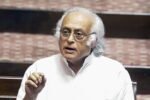NEW DELHI, June 12: Ajay Navaria, who teaches Hindi at Jamia Millia Islamia, wanted to highlight how different castes behave and interact with each other and also write about the struggles of the emerging middle class among Dalits in urban India and thus his novel “Udhar ke Log” was born.
“Worlds within Worlds”, the English translation of the Hindi work, deals with a plethora of topics ranging from conversations and debates regarding current caste politics to deconstructing of wedding rituals.
In the novel, translated into English by Nita Kumar and published by Niyogi Books under its Thornbird imprint, the various characters portray the multiplicity, and offer myriad ways and means, to understand caste and power in everyday life across socio-economic and cultural landscapes.
Navaria says caste is “not only the social reality of India but sadly, it is also the economic, political and cultural reality” of the nation.
In this way, the concept of caste deeply affects the lives of the Indian people and their human sensibilities like love, friendship, spirit of cooperation, compassion, anger and generosity, he says.
“While writing this novel, this was the basic thought that compelled me. I wanted to highlight the way different castes behave and interact with each other. There is love and jealousy among different castes, competition and distrust, growth and divergence. Apart from this, I also had in mind the aspirations, sufferings and struggles of the emerging middle class among the Dalit castes in urban India,” Navaria says.
Kumar says translating the book was a double treat – linguistic as well as sociological.
“You enjoy the two languages you are translating from and to and get to play around with the nuances of both English and Hindi. Also, you get to know a subject intimately, and in this particular novel, a Dalit family,” she says.
“Worlds within Worlds” is the story of a young man with literary-philosophical interest who goes through several love interests and groups of friends and grows from a relatively little-rooted young lecturer to a mature professor and father in the course of the novel.
That he is Dalit is a central and essential identity of the man, the son, the brother, the thinker, the teacher, the social worker, the lover, the father. The book looks at conversations, both private and in social settings, as a lens from which to study caste and power relations, with its huge potential to mould perception and manipulate and affect ground reality. (PTI)












